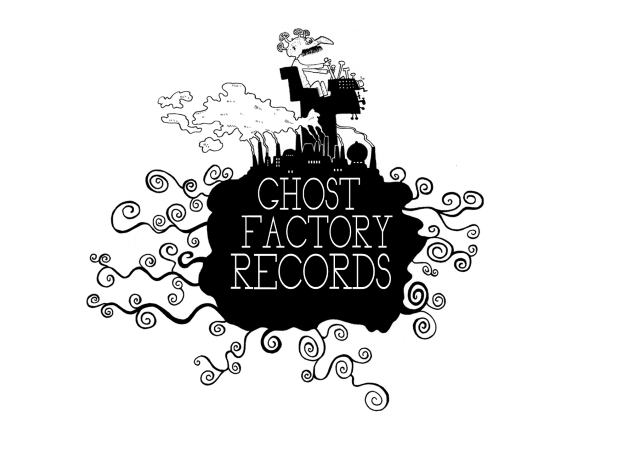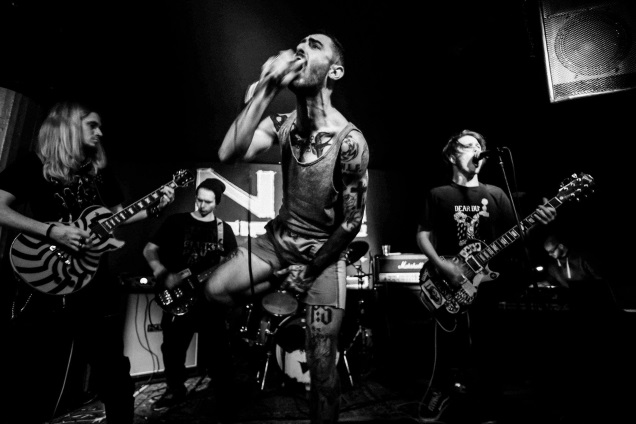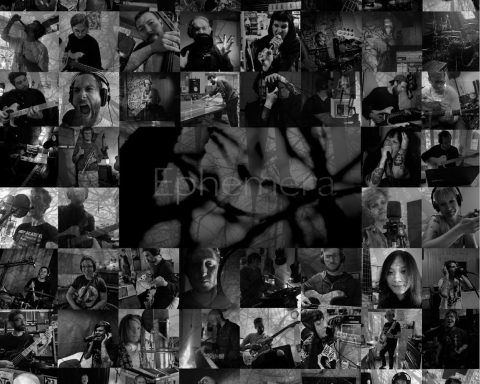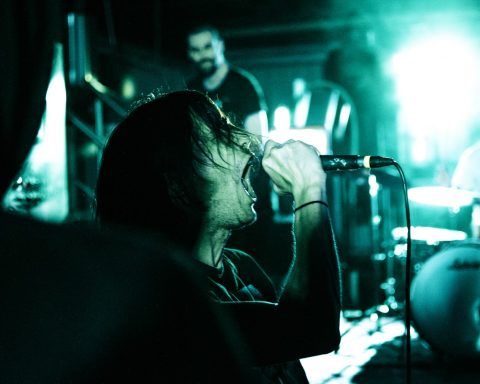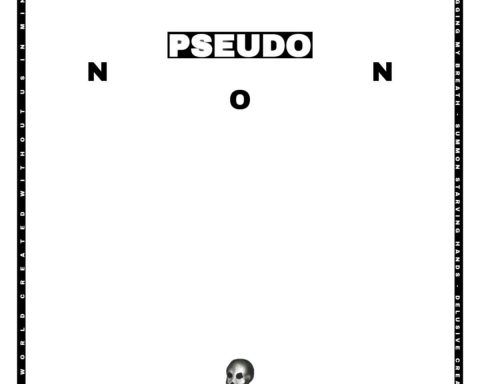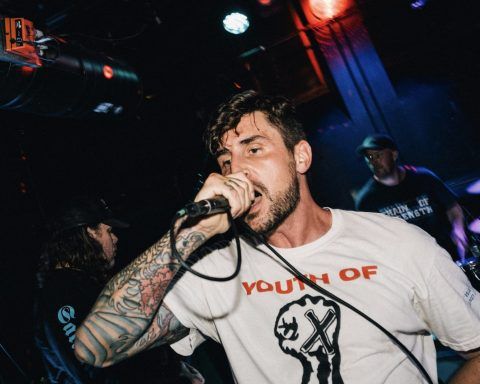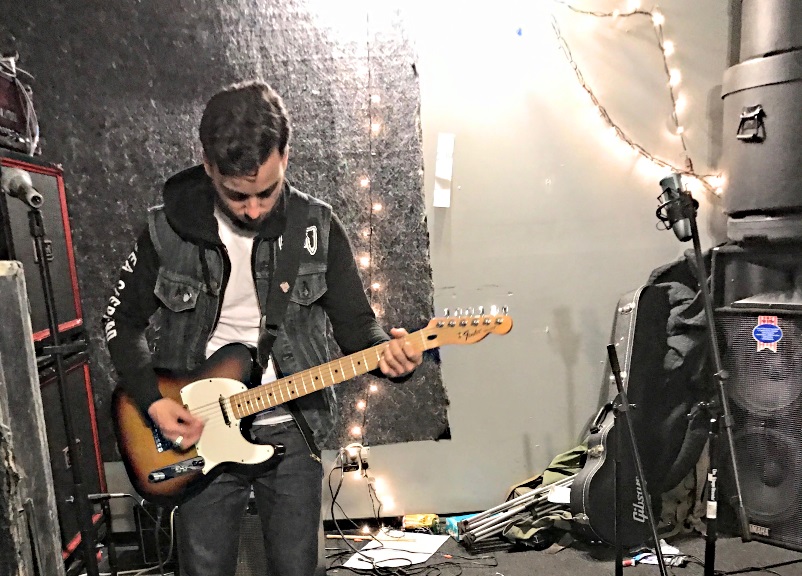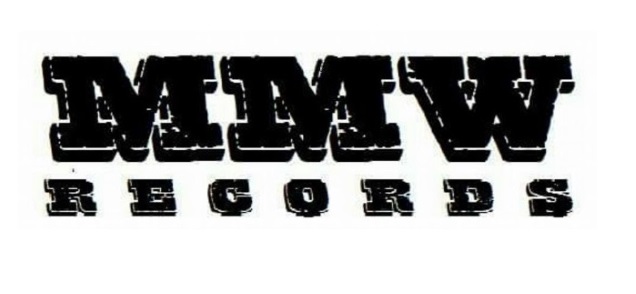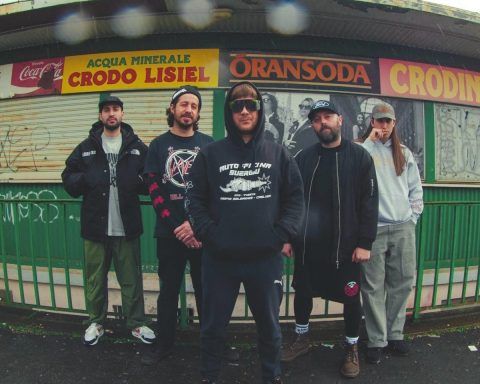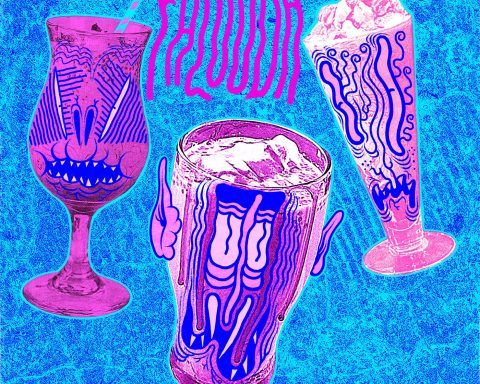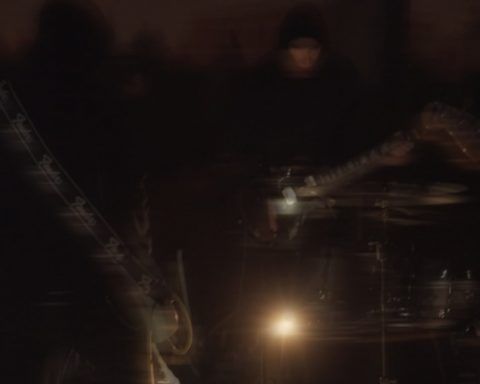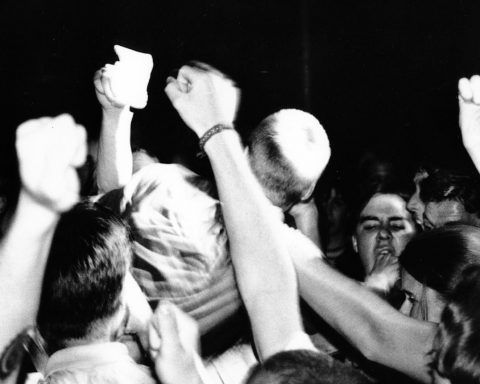Based in San Miniato, Pisa, Italy, Samuele Matta’s Ghost Factory Records & Arts is an independent label, mail-order, event production and visual art promotion factory that doesn’t limit itself to genres and it seems that the only requirements for the artists are that you should be a creative, engaged and passionate. Run by a quartet of passionate art supporters including Alessandro Biagiotti (booking/production) and Chiara Borredon (promotion), the group has been recently rounded out by Tommaso Marchiani, a talented sculptor and painter, now responsible for the newely established visual arts section with the mission to promote worthy activities in the fields of sculptures, paintings, photographies, videographies, woodcuts, and illustrations. Ghost Factory Records gathers and supports loads of young artists with a solid attitude and it is my pleasure to share our recent interview! I took some time to interrogate Samuele and learn more about the area of Pisa, Ghost factory Records’ releases and the labels’ view on DIY art.
Artwork / Logo by: Elena Jezebel
Hey Samuele! How are you? How’s Pisa doing this Winter? Is it also freezing as hell where you live? :)
Hi Karol, here we are holding it with booze and stitches. This beginning of the year has been very strong in many senses.
I spent a couple of days in La Spezia, Riomaggiore, and Monterosso Al Mare a couple of years ago. I believe it’s not too far from Pisa, right? Tell us more about your closest neighbourhood and its local independent music scene.
Oh, great places, you know how to treat you well, don’t you?! Yes, it’s not too far, but it’s way too expensive if you cede to local comforts, so we love to spend the holidays in Livorno, at Sonnino, a free semi-hidden area away from business. This city, Livorno, has a real independent music scene that started with Inconsapevole Records almost 20 years ago, which nowadays has grown a lot of solid young local bands making records and touring around the globe. There is not a proper local scene in Pisa, as the major reference for the west coast area are Inconsapevole and AreaPirata Records, this last based in Massa. Most of the bands are trying to play in this cities simply because it’s where most of the people hang out to see alternative and punk rock shows. Then, away from the coast we have Florence and Prato, where hardcore and metal bands dominate the tuscanian music scene. The main events of our peninsula are used to take place in north Italy because big cities like Milan, Turin, Venice, Bologna are geographically better located in relation with other european coutries, which is very important for a routing plan of a tour. Anyway, Ghost Factory is not based in Pisa City, we are 40 km away in the country side, located in San Miniato, Pisa’s province, which is almost half distance from Florence and Pisa and so, very near to Livorno, but really close to Empoli also known as Empolese Val d’Elsa District where some bands of our roster like SAAT (stoner rock) and 30 MILES (punk rock) are based and where we are trying to build a new alternative music area to connect those cities to each other, like a chain.
Are you yourself a band member?
Yes, for sure. I play as singer/guitarist with 30 MILES, punk rock band started in 2010. I have released a pair of Eps and an Lp with them up to this day. I’m really proud of them. It’s such an eclectic band. I’m also the guitarist of , hardcore punk band started in 2007 and based in Florence. I’ve recorded my very first record with them in 2009, which was a red 7” split with INTOTHEBAOBAB, modern d.i.y. celebrities around here. I was 15 or 16, golden days. I think it’s very important for a label director to have been on tour and in the studio as musician, becauseit’s necessary to understand the roster bands needs and to set the best deal and plan for everyone, especially if you work with young people who are scared of how the music industry could take advantage of them. It’s not only business at all, I mean, It’s very important to give the artists the opportunity to learn and face the efforts that anyone must pander to book a tour or to release a record, or best of all, how to plan the promotion. At the end the artists must be able to do it on their own and recognize what type of collaborations they need to develop their work at best or to start a record label.
Photo: PISCIOSANGUE
What led you to launching this Ghost Factory Records? How it fits into your local punk music scene?
I don’t love music, I adore it, it’s more like a major power or something like. I wanted my own space, my own choice and to build a local music area filled with friends, touring bands and records. It has started as a booking agency in 2013 to bring young fresh touring bands coming from who-cares-city to our gray and boring towns. Venues started to get full and a little tribe of growing musicians discovered that it is possible to sell records and touring without being a big band and so I began pressing their records. In 2015 we have abandoned the punk format and decided that for us punk means freedom and as a freedom form it doesn’t matches with a preset genre, so we are now releasing any type of music.
Who’s helping you out? How organized is Ghost Factory?
I’m handling the music section with Alessandro Biagiotti, member of the skate-punk band CROSSWISE DECAY, part of the GF roster, which helps me out with events, booking and productions. The visual art section is directed by Tommaso Marchiani, painter, sculpter and band-mate in 30 MILES, while Chiara Borredon is a photographer, video-editor, tour-driver and a lot of other things. She’s working with us on video promotion.
What triggered your desire to go beyond records and shows and invest your time and energy in promoting visual arts? How do you balance between these two fields of activity?
Music is probably the best way to express feelings, but you can’t see it. The visual arts section is a project born to give the same chances to other genres of artists to express and promotethemselves, like musicians do. We have young talented people like Tommaso Marchiani (painter/ sculpter), Vanessa Davini (painter / art performer), Chiara Borredon (photographer), Federico Santini (painter) Andrea Barucci (sculpter / painter) Chiara Gini (photographer) & others, producing beautiful and inspired pieces of art. We started to produce events including music and visual arts in different types of venues (clubs, squats, bar, theaters) and people turned out very curious after 2-3 hours of high volume music. In short, even the eye wants its part. The newchallenge for our label is to create something similar to a touring circus composed by touring artists, (musicians and visual artists together), coming from the Ghost Factory’s roster.
With- 2016 being another huge year for digital distribution and further expansion of web and mobile solutions, how do you feel it has impacted DIY labels and physical aspects of independent music scenes?
In my modest opinion, it’s hard to put in the same phrase “digital distribution” and “D.I.Y.” because, doing it yourself imply the distribution process too. Now we can, but thanks to the internet, which is lead by multinational companies. We are independent, for sure, but I don’t think that we can call it a proper “D.I.Y.” and nowadays it’s hard to stay on board without digital selling, but it also depends on the music, that’s how much the web has impacted on us. It had a great impact on commercial music, it’s simply everywhere. Emotional music has nothing to share with files, metadata and the web. I mean: people who listen to hardcore, punk rock and alternative music in general, love to put on a record and lay on the bed reading the lyrics. It could be a kind of ritual, to celebrate the hero who represents a period of their lives; they are “aficionados”. What’s saving the independent music scene is that we have fans! Commercial music is almost based on promotion and fashion. It changes periodically like the faces that you see on tv, if you still watch it. The huge good note is that labels and bands now have the tools to build a direct contact with their fan-bases, clients, distributors etc.. But this is happening since Radiohead released “In Rainbows” in 2007, as the first “up to you” digital album ever released on the web. In my modest opinion the consequence has been a marketing race between the competitors to make more competitive deals for the listeners, dragging the industry to collapse. It could be possible that the internet mixed with this “collapse” gave a chance to independent music to be head from the ones who were looking for something not included in the mainstream range.
I believe that one of the best things about DIY labels and gig collectives is developing closer relationships and bringing people together under one roof. Why do you think is it so important for DIY ventures like independent labels to engage with each other?
The co-production is vital! It helps to mix ideas, to find new inspirations, to grow a scene to know new people and so, making friends. Individualism is the right way if you have a considerablebudget. Every year independent labels could be on the way to stop the production if the budget it’s not well spent. There must be partnership to split the production costs, promote and distribute too. The main target for every label remains to produce successful works to grow a solid scene.
Do you think punk community have a responsibility to help people, donate, give back to their own, but also those in need, charities, etc.? Have you developed this kind of approach over the years?
Yes, It does. “If you think that punk rock doesn’t mix with politics, you’re wrong”. Social problems are politic. I think if you are part of a collective that’s trying to build something, then you are already helping the community just by doing it. If you are part of a reference collective for the community you are probably selling a certain amount of records and in my opinion, at this point, it’s your duty to donate part of the revenue and to set a good example for the community. Ghost Factory is part of the first example, but our punk bands are used to play at a lot of benefit shows for squats, refugees, counter-activities, and activists charged for acts against the law.
Who are some of the GF releases and events confirmed for this year?
In the first half of this year we are releasing new acts: SITTINGTHESUMMEROUT (It – pop punk), SEEHEARSPEAK (Slo – melodic hardcore), IL PROPOSITO (It – alt. rock) and in the second half we are going to make happen the new one of my 30Miles, the band I play for. There will be a free space for last-minute acts, we couldn’t bear to lose some pearl for any reason. As you can imagine,being in a small label implies a few people working on the projects and consequently more time is needed to optimize the revenue. In substance less is more. Anyway, if you want to hear some more music we also advice PISCIOSANGUE (old school italian hardcore), REAL LIFE VERSION (Slo – punk rock), Le Maschere di Clara (It – Avangard/dark/instrumental). All this records are / will be available in physical edition on ghostfactoryrecords.bigcartel.com
Does the selection of bands imply a certain kind of added value for the label? How do you select your new additions?
We are into artists (and consequently people) with identity, purposes and attitude, making a lot of Km on the road to present, express and promote themselves. New additions are humansmaking touching pieces of art, no matter which type.
Is it possible for a DIY label to make a substantial income from its activities?
To make it happen a label needs one or more known bands making solid, fresh music and touring as much as possible. Always not forgetting that the income comes from the fan bases, people are the Boss. It’s vital to take care of fans, they are keeping the music on. So yes, it’s possible, but very hard.
What’s your recipe to make Ghost Factory work?
Quality instead of quantity, art fusion, passion, dedication and a sort of digital marketing knowledge.
Great, thanks so much for your time! Feel free to add your last words.
Thank you Karol & all the IDIOTEQ staff for this awesome chance to tell a lot of things about Ghost Factory Records & Arts. We are pleased to be shared with your readers.



